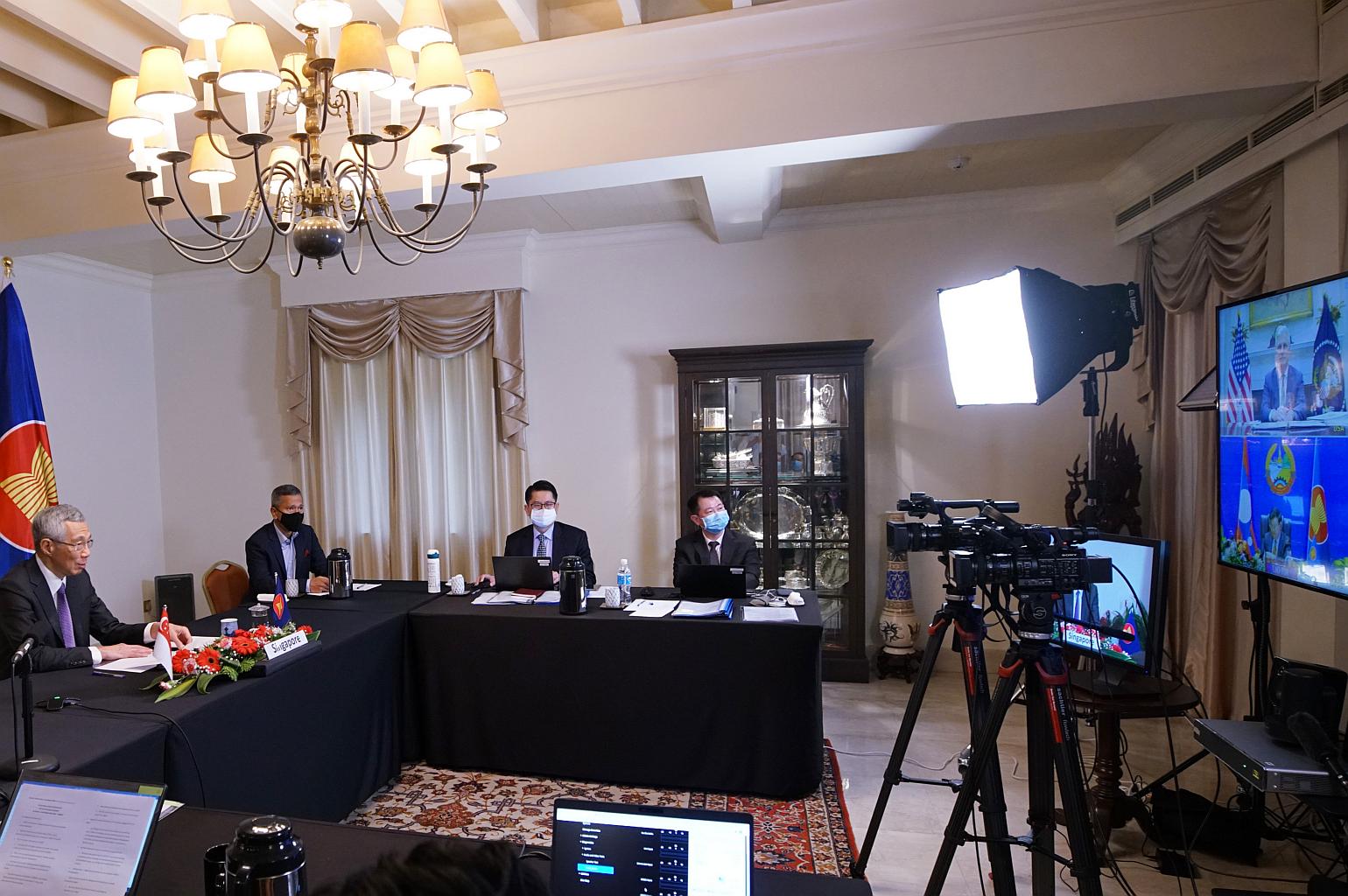Asean Summit: Political and security issues, economy key areas of US-Asean cooperation, says PM Lee
Sign up now: Get ST's newsletters delivered to your inbox

PM Lee said the US has been a vital partner for Asean since the end of World War II, and thanked it for its support to the region during the Covid-19 crisis.
PHOTO: MINISTRY OF COMMUNICATIONS AND INFORMATION
Fabian Koh
Follow topic:
SINGAPORE - Singapore hopes that the United States will further broaden and deepen its presence in this region, Prime Minister Lee Hsien Loong said on Saturday (Nov 14), highlighting political and security issues , and economy as key areas of cooperation.
Speaking at the 8th Asean-US Summit, PM Lee said the US has been a vital partner for Asean since the end of World War II, and thanked it for its support to the region during the Covid-19 crisis.
The virtual summit was attended by US National Security Adviser Robert O'Brien, who represented President Donald Trump. The lack of high-level US representation at the annual summit disappointed some quarters of the US establishment, such as the business community.
During the session, PM Lee said Singapore hopes that the US will further broaden and deepen its presence in this region, and welcomes the US' continued security presence in Asia.
He said the Republic appreciates American support for the Asean Outlook on the Indo-Pacific, which is the bloc's plan to develop the Indo-Pacific region.
He also noted that operations of the US' Seventh Fleet help strengthen regional security and safeguard the rights of regional countries under international law, such as the United Nations Convention on the Law of the Sea.
"We also hope to continue to work with the US to uphold the rules-based international order, including by supporting multilateral institutions, and finding multilateral solutions to global challenges like climate change and pandemics," he added.
PM Lee also highlighted the strengthening of Asean-US economic ties, by protecting supply chains, maintaining open and unimpeded trade flows, and safely resuming international travel.
"This would benefit many US companies which have longstanding business interests here," he said.
PM Lee called for the US to continue supporting Asean's efforts to deepen economic integration with partners, such as through the Regional Comprehensive Economic Partnership (RCEP), which will be signed on Sunday, and the Comprehensive and Progressive Agreement for Trans-Pacific Partnership (CPTPP) which was signed almost three years back.
"There is much strategic value to strengthening economic integration. It gives us a larger mutual stake in one another's growth and well-being and will help sustain the Asia Pacific as an oasis of stability and prosperity for many years to come," said PM Lee.
In his speech, PM Lee also said that the longstanding US presence in the region has created a stable and conducive environment for peace and stability, fostering regional prosperity and allowing countries to concentrate on economic development.
This has resulted in the economic relationship between Asean and the US growing steadily over the years, with mutual growth and benefit.
The stock of American investments in this region, for instance, is now US$329 billion (S$443 billion) - exceeding the amount in China, India, Japan and South Korea combined.
"Many American companies are household names in Asean. Even in some of the most remote areas in our region, you can find Coca-Cola and Colgate," said PM Lee.
He said Singapore strongly welcomes the US' continued engagement in the region, such as through the Asia Reassurance Initiative Act, which will provide US$1.5 billion to the Asia Pacific annually for five years, and the Better Utilisation of Investments Leading to Development Act, which has created US$1 billion in investments in Asean countries since 2018.
"We appreciate that during the Covid-19 crisis, the US has been a supportive partner, providing financial and technical assistance to Asean member states," PM Lee added.
In his opening remarks in the summit, Mr O'Brien said: "At this time of global crisis, the US-Asean strategic partnership has become even more important as we work together to combat the coronavirus."
"We deeply appreciate Asean partners' efforts to keep the key supply chains open, factories operating and PPE (personal protective equipment) flowing," he said, adding that "the United States has your back and we know you have ours".
Some in the US bemoaned that, once again, it had chosen not to send at least a Cabinet member to the annual gathering of South-east Asian leaders.
Some in the US bemoaned that, once again, it had chosen not to send at least a Cabinet member to the annual gathering of South-east Asian leaders.
The US-Asean Business Council noted that President Trump had only participated once back in 2017, and has sent a representative every year since.
In 2018, it was Vice-President Mike Pence, while National Security Advisor Robert O' Brien also represented the country last year.
"We are deeply disappointed by the Trump Administration's repeated decision to have neither the President, Vice President nor a Cabinet Member lead the US delegation to these critical Summits in the last two years," said Mr Alexander Feldman, chairman, president and chief executive officer of the US-Asean Business Council.
"Showing up matters. High-level representation not only reaffirms the US commitment to the Indo-Pacific and Asean, but as a Pacific nation, the United States has an obligation to help forge a free and open Indo-Pacific for all."

